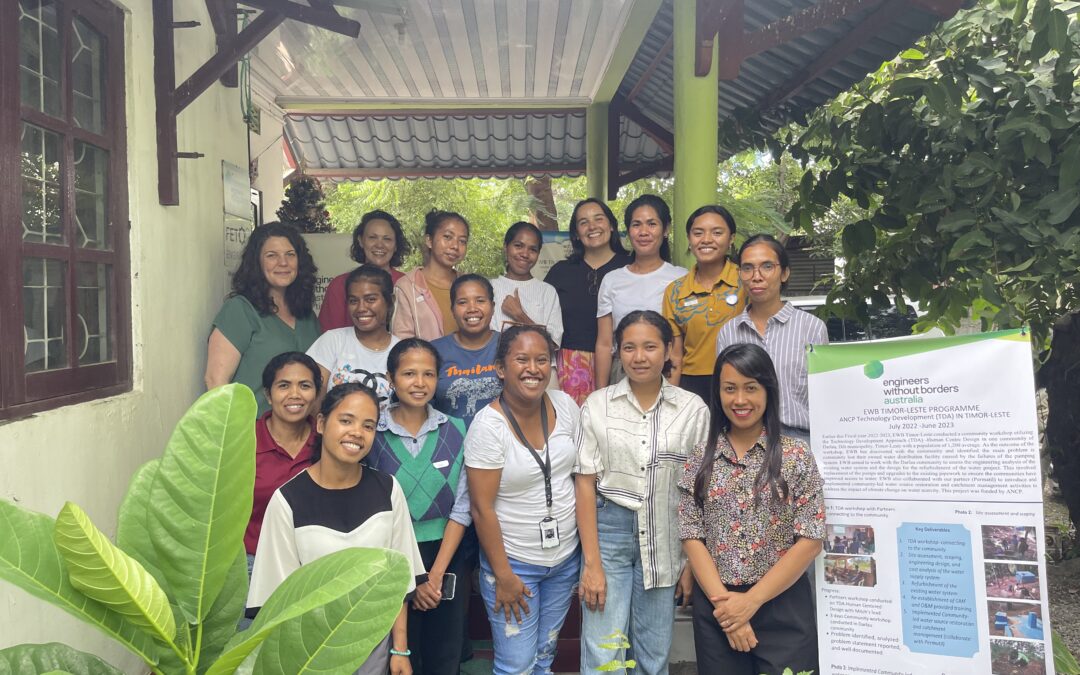Featured image: ‘Feto to the Front’ graduates with the representatives of the US Embassy in Timor-Leste and EWB staff and volunteers in the Timor-Leste office in Dili.
In Timor-Leste, water is a woman’s problem. In rural and regional areas, water generally isn’t delivered into homes – women and children manually fetch water from the natural springs and carry the household’s water supply back home every morning. It’s heavy work and can take them quite far afield in an often rocky, mountainous region.
Although water is a woman’s responsibility, and the burden of poor water infrastructure becomes a woman’s problem, there aren’t many women engineers working in the water, sanitation and hygiene (WASH) sector.
Engineering continues to be a male-dominated industry, especially in a country like Timor-Leste, where traditional gender roles are still influential in dictating what people do for work. But a new program delivered by the Engineers Without Borders Australia (EWB) team in Timor-Leste seeks to change that.
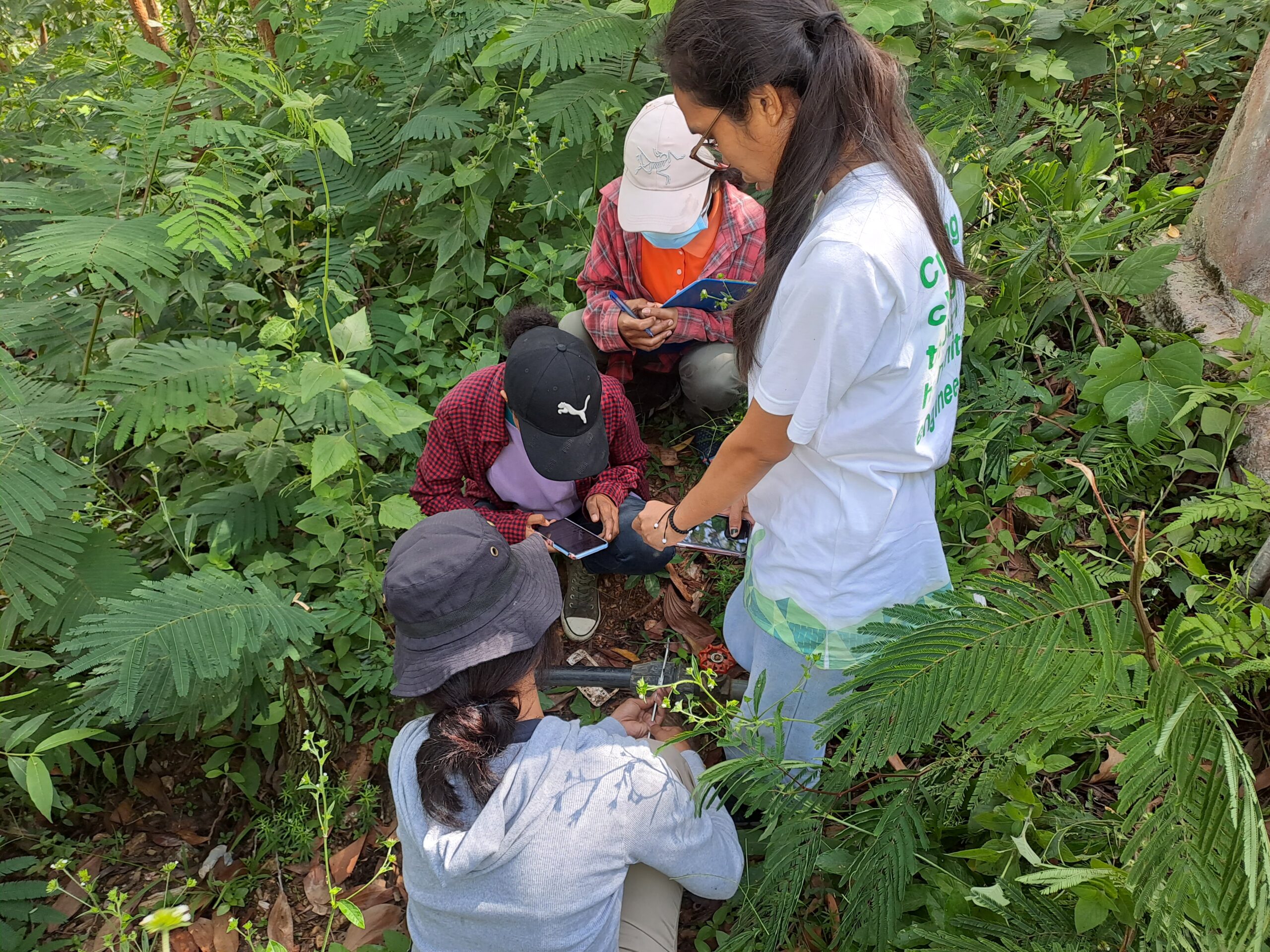
‘Feto to the Front’ graduates measuring the pipe system for the water supply in Fahiria.
“Feto” means “woman” in Tetum, the official language of Timor-Leste. The EWB Feto to the Front project is providing 12 women engineering graduates with 18 months of on-the-job support and a living stipend as they complete real WASH projects with EWB’s team of engineers based in Dili, Timor-Leste. The program officially began at the start of October 2023 with WASH projects in two rural centres – Fahiria in Aileu municipality in the north and Maina1 in Lopalos municipality in the northeast of the country. The aim is to give the group of women engineering graduates real-world experience implementing a project in communities that need improved access to water. Better water access is a top priority for the Timor-Leste government too – they’re aiming for 100% water-system coverage by 2030.
“The projects are focused on the improvement of water systems in rural areas,” said Elsa Ximenes, EWB Program Support Officer. “The 12 interns will be either leading or supporting, supervising or monitoring in the field during the project implementation. [They’ll learn] how to supervise the projects as they are constructed by the communities. They will do some design of water systems for the implementation. They will reflect on the design that we’ve already done. And they’ll do some engineering data collection and assessment before and after the project is implemented.”
The WASH projects in Fahiria and Maina1 aim to improve the community’s access to equitable, clean and climate-resilient water services. In the long term, they also intend to set the local communities up to independently operate their water services in a gender-equitable way. The graduates and their EWB mentors will (and have already begun to) collect longitudinal data to judge the effectiveness of the program. They’ll base their evaluation on data points like the availability of water in both wet and dry seasons, the quantity of water available and the number of hours people spend collecting water each day. To support their goal of gender-equitable water services, they’ll also look at metrics like the percentage of women within the community who are trained to maintain and operate the water solution. With this evaluation framework, the Feto to the Front program is putting women first in all contexts.
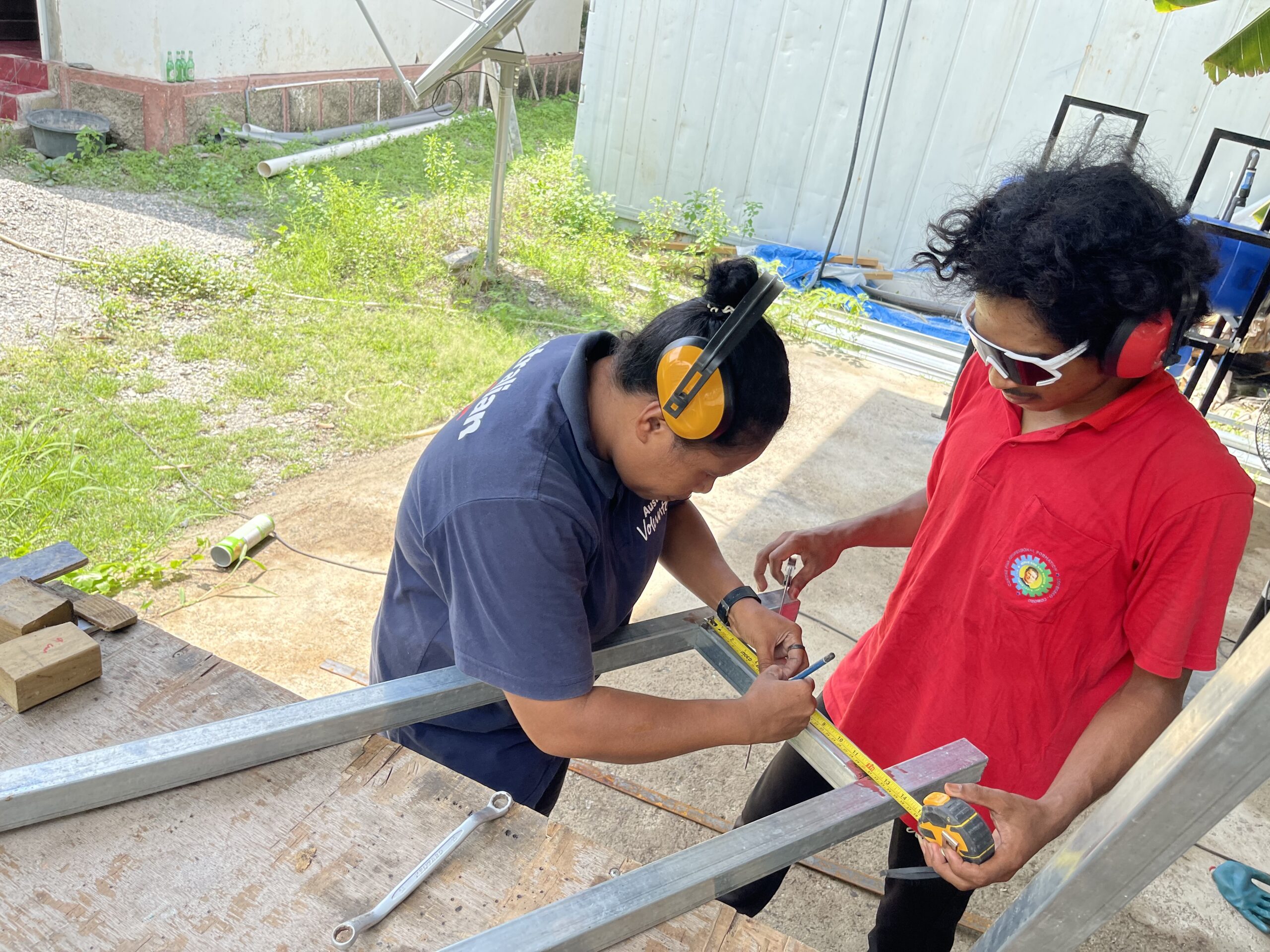
‘Feto to the Front’ graduate Joanna and volunteer Cesar participating in a hands-on workshop focused on fabricating water system materials ahead of implementation in Fahiria and Maina.
The graduates will see the program through from beginning to end, from consultation and design to implementation and monitoring. While they do the work, they’re also upskilled and supported by the EWB team in both Timor-Leste and Australia. While a lot of skills are taught in classes and workshops (like hydraulic system analysis and rainfall data collection and management), the graduates will also learn some practical skills to put into practice in the field – like welding and using power tools.
This isn’t the first mentoring and upskilling project by EWB, but it is the first of this size. The 12 graduates were initially slated to “learn by doing” for 12 months, but the program has been extended to 18 months. And it’s already working.
“I have already noticed some positive outcomes for the graduates,” said Elsa. “When we sit together, they always say it really inspires them to learn more. It makes them competitive for other jobs … some of them already have job [offers]!”
Elsa began working for EWB as an intern in 2019 and knows how important those early years are for fledgling graduates trying to find their place in the industry. But the program has positive effects for other women, too.
“It’s really important [for women to be involved in the WASH sector] because in rural areas, for technical things like how to operate and maintain the water system, it’s mostly men in the operating and maintenance team,” said Elsa. “So when women engineers are involved in this project, we’ll be encouraged to see other women in the rural areas think ‘Oh! Women can do that [job]’.”
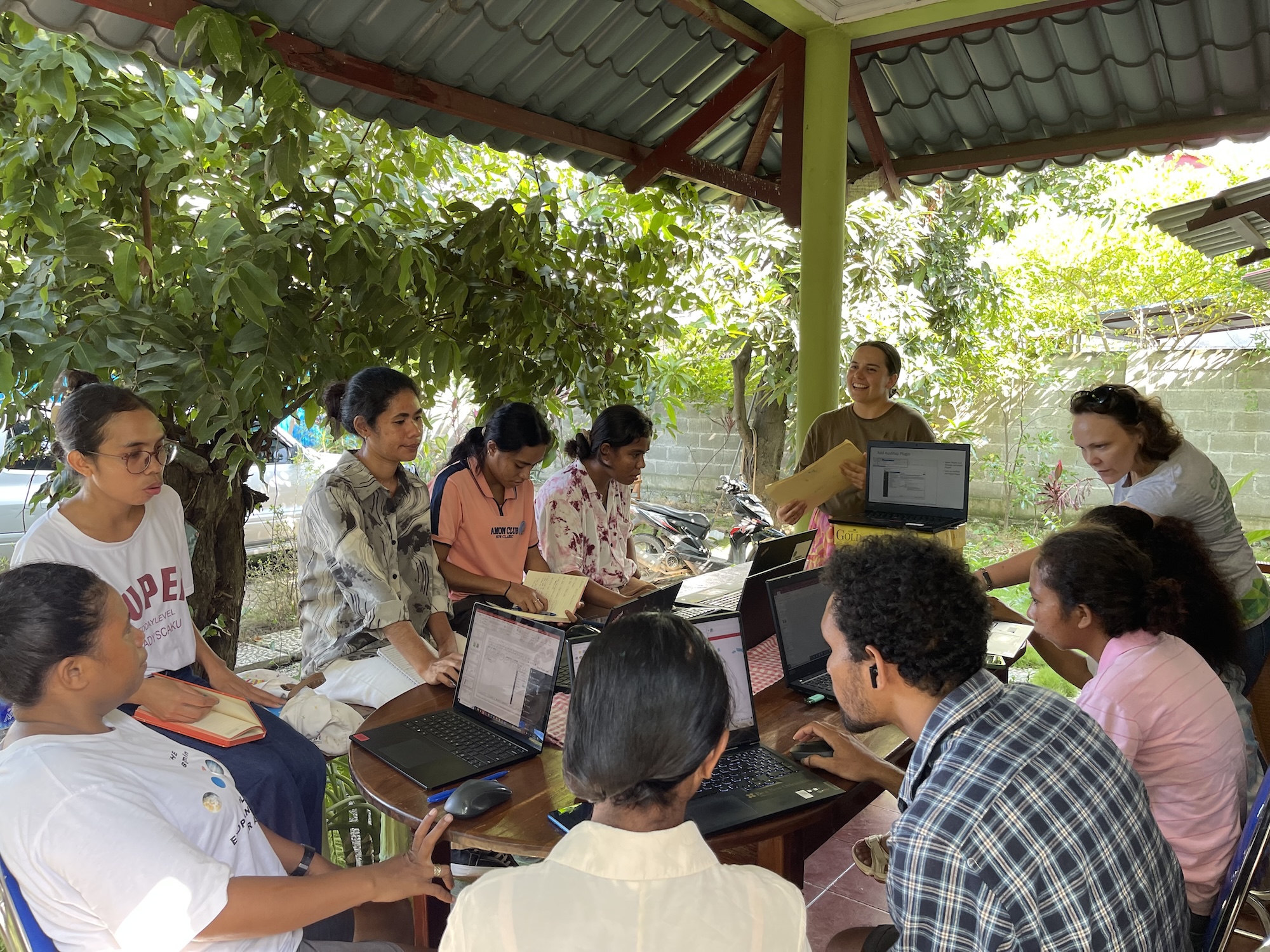
‘Feto to the Front’ graduates in a training session.
It’s important to invite women to understand that they have a place in the engineering industry, not just for the unique insights they bring to the WASH sector, but also because of the prestige and economic freedom that a technical job can provide. The average starting salary for a full-time engineering graduate in Timor-Leste is more than double the average wage in Timor-Leste. Graduate engineer salaries can be even higher than double, depending on the role and where the graduate works. In addition, engineering is a highly respected field because of the tangible impact it has on people’s lives.
“The position of engineer has so much honour for women,” Elsa said. “People in Timor Leste are proud of [women engineers] for being involved in community development for wellbeing.”
The graduates are currently reporting monthly on their activities and receiving feedback on their writing and documentation as a way to develop their report writing capabilities. But the EWB project team are also actively monitoring the project to make sure the graduates are learning the right skills to take them into the industry. But so far, the camaraderie, teamwork, and outcomes have been encouraging.
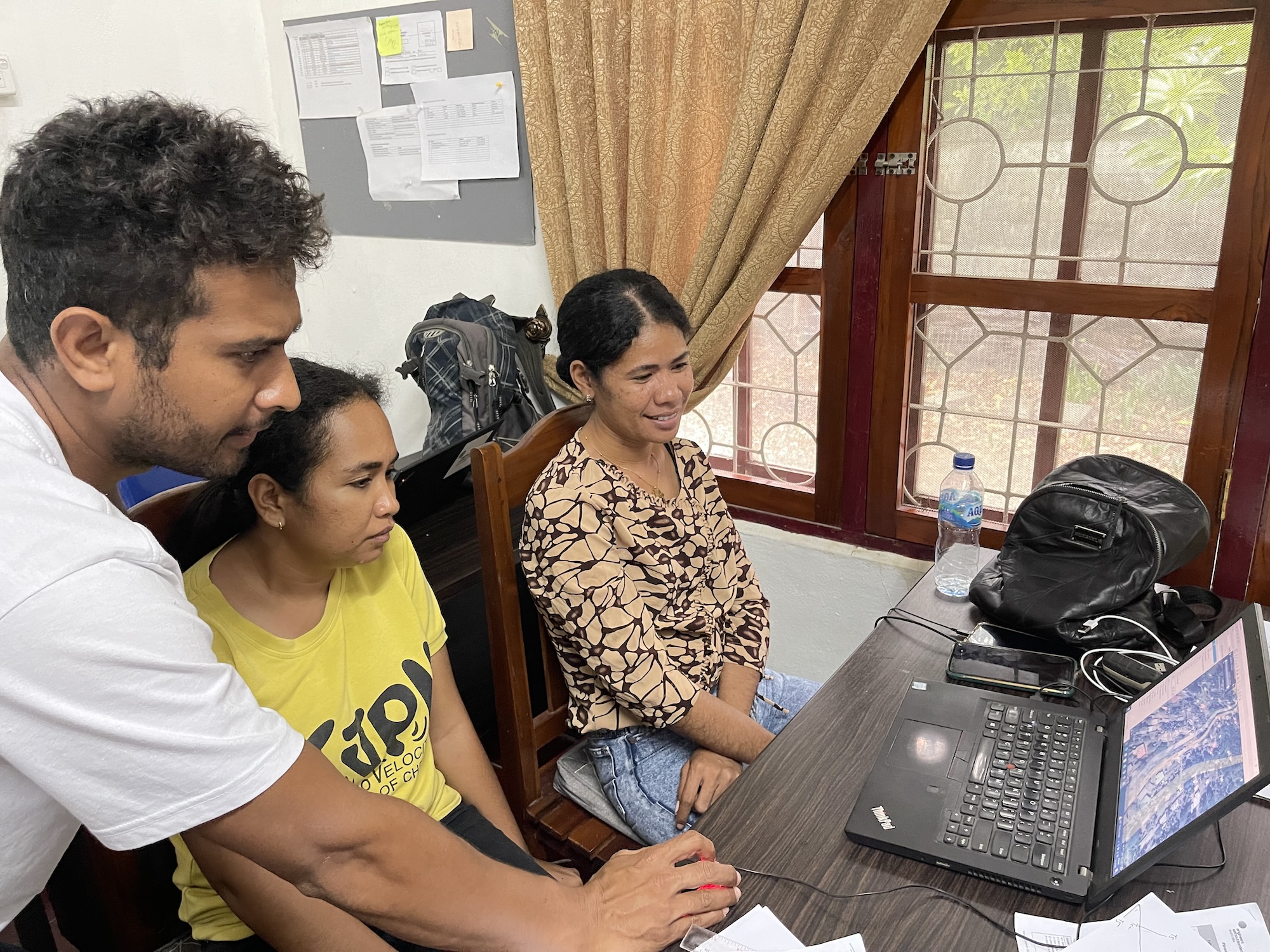
‘Feto to the Front’ graduates Crissia and Angelica with EWB Technology Development Lead Romeo.
“I’ve seen really easy and successful teamwork within the program – the engineers didn’t know each other before joining the program and are now a really great, tight-knit group,” said Rebecca Brown, an EWB Field Professional who has been volunteering with the team for the past seven months. “I am consistently surprised at how eager people are to learn – everybody is always so engaged in any training or workshops, and always so keen to go into communities to do the work.”
Our team of women engineers have the expertise to bring clean water to rural communities like Fahiria, but we need your help to make it happen. Please donate here to fund the infrastructure that will transform the lives of women and children who bear the daily burden of poor water access.
This program receives funding from the US Embassy in Timor-Leste through the Ambassador’s Small Grant Fund under the Foreign Assistance Act.
EWB Australia’s work in Timor-Leste receives support from the Australian Government through the Australian NGO Cooperation Program (ANCP). Every donation you make to this project will be combined with this government funding to reach more people.


